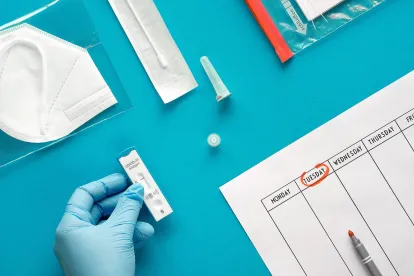On January 10, 2022, the U.S. Department of Health & Human Services, Department of Labor, and the Treasury (“Tri-Agencies”) published guidance about how health plans and health insurance issuers must reimburse OTC COVID-19 tests. As first announced by President Biden on December 2, 2021, the Biden Administration explained that health plans and health insurance issuers (meaning the commercial insurance market) would be required to reimburse individuals who purchase OTC COVID-19 tests during the public health emergency. The Administration directed the Tri-Agencies to issue guidance by January 15, 2022 detailing how to effectuate this expanded coverage of COVID-19 diagnostic testing. Yesterday, the Tri-Agencies published FAQ 51 which requires health plans and health insurance issuers to cover no less than 8 tests per 30-day period per individual beneficiary beginning January 15, 2022.
The guidance relies on the existing authority under FFCRA § 6001 (as amended by CARES Act § 3201) to require health plans and health insurance issuers to cover consumer-purchased, at-home COVID-19 diagnostic testing. That law broadly requires coverage of any COVID-19 diagnostic testing that has been approved, cleared, or authorized by FDA or for which the developer has requested emergency use authorization and tests authorized and used by a state to diagnose patients. This coverage mandate prohibits the application of cost sharing, prior authorization, or other medical management requirements. Cares Act Section 3202 generally requires plans and issuers to reimburse providers for those tests at the negotiated rate or the cash price posted by the provider.
Previously, coverage of an at-home COVID-19 diagnostic test required an order by an attending provider who determined “that the test is medically appropriate for the individual based on current accepted standards of medical practice and the test otherwise meets the statutory criteria in section 6001(a)(1) of the FFCRA.” FAQs About Families First Coronavirus Response Act and Coronavirus Aid, Relief, and Economic Security Act Implementation Part 43 (cms.gov) (Jun. 23, 2020) at 6. Now, however, there is no such limitation—plans and issuers must cover OTC COVID-19 tests “that do not require a health care provider’s order under the applicable FDA authorization, clearance, or approval” without cost-sharing or UM. FAQs about Affordable Care Act Implementation Part 51, Families First Coronavirus Response Act and Coronavirus Aid, Relief, and Economic Security Act Implementation (dol.gov) (Jan. 10, 2022) at 5.
The guidance also provides an enforcement safe harbor through which plans and issuers cover tests purchased through their pharmacy networks and via a direct-to-consumer shipping program and must take reasonable steps to ensure adequate access to OTC COVID-19 tests for their plan participants and enrollees. “Adequate access” must take into account relevant facts and circumstances, such as the member’s location, current utilization of the plan’s network, dates and availability of tests at participating retailers, and the overall intent of the safe harbor to facilitate seamless access to free OTC COVID-19 testing. Plans and issuers that comply with the safe harbor must cover at least 8 tests per 30-day period per individual beneficiary and may limit the reimbursement of OTC COVID-19 tests from non-preferred pharmacies or retailers to the lesser of the actual price or $12 per test—though plans and issuers may provide more generous coverage. The guidance also explains that plans and issuers that limit reimbursement for OTC COVID-19 tests from non-preferred sellers must calculate the reimbursement based on the number of tests in a given package.
Plans and issuers may take reasonable steps to combat suspected fraud, waste and abuse, such as ensuring that the tests were purchased for a covered person and requiring reasonable documentation of proof of purchase. And, consistent with prior guidance, plans and issuers are not required to cover OTC COVID-19 testing (or other COVID-19 testing) that is for employment purposes.
Finally, if a plan or issuer is unable to ensure adequate access to OTC COVID-19 tests, such as if there are significant delays for plan participants or enrollees to receive tests via the direct-to-consumer program, then the plan or issuer cannot rely on the safe harbor for the duration of such delays. As a result, plans and issuers cannot deny coverage or impose cost-sharing on OTC COVID-19 tests obtained from non-preferred sellers during that time.



 />i
/>i
